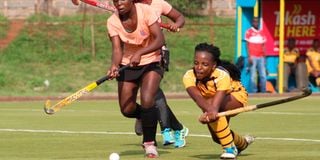Misogyny in sports media: It is time for a cultural shift

Ruth Adhiambo of Strathmore vie for the ball with Rachael Njogu of USIU-A during the Kenya Hockey premier league Women Match at City Park Nairobi on June 16, 2019.
What you need to know:
- In the story, Ms Adhiambo explained that she couldn't wait to get back to the pitch, as nothing made her happier than playing hockey.
- To be fair, the choice of headline is the editor's prerogative, not the writer's or interviewee’s.
- A newsroom is typically dominated by male editors, so, in essence, it was a losing battle
“Why Ruth Adhiambo is itching for the stick once again" is a salacious headline that continues to stain the legacy of a local newspaper in Kenya. This September 2020 title was recently the subject of a robust debate during a gender training of trainers’ session I attended.
In the story, Ms Adhiambo explained that she couldn't wait to get back to the pitch, as nothing made her happier than playing hockey. During this time, the country had been on lockdown for six months. To be fair, the choice of headline is the editor's prerogative, not the writer's or interviewee’s.
While it meets the threshold of a good headline—being interesting, engaging, and inducing readers' curiosity—it fails terribly when measured against ethical reporting standards. It fails to treat the woman equally as a story subject, and the language borders on obscenity.
One of the editors of the newspaper in question was present during the training session. She explained that she had put up a fight against the headline but was outnumbered and outgunned.
After all, a newsroom is typically dominated by male editors, so, in essence, it was a losing battle. It became clear to me that the headline had all the qualities that a misogynistic editor would appreciate—a woman was involved, she was being objectified and there were sexual innuendos.
I have observed enough headlines and seen enough salacious photos and videos of sportswomen’s bodies to be convinced that there is a problem in how women are portrayed in sports news. Ms Adhiambo’s example is just one of the many injustices sportswomen face as story subjects.
A quick check revealed that the headline in the local newspaper has never been changed, even though there had been several social media complaints when the story was published.
I was pleasantly surprised to read recently on Sky News that the Olympic Broadcasting Services CEO Yiannis Exarchos admitted that camera operators and directors are sometimes guilty of showing different shots of women and men as they compete. He added that there was “an unconscious bias, which reflects this very traditionalist stereotype”.
The BBC also reported that a veteran sports commentator was sacked from his Olympics role after making a sexist remark about Australian female swimmers following their gold medal win.
Apparently, as the 4x100m freestyle relay team was making its way off the pool deck in Paris, Bob Ballard said they were "finishing up," adding, "you know what women are like... hanging around, doing their make-up."
The world is paying attention to how sportswomen are covered now that the Olympics 2024 Games are underway, and I hope our sports writers and editors will follow suit and rewrite the playbook to end gender bias in sports journalism.
The writer comments on social and gender topics (@FaithOneya; [email protected]).





